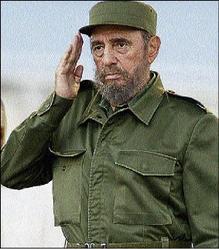Earl Moxam, Senior Gleaner Writer

Cuban President Fidel Castro salutes during a speech in Havana, Cuba, in this May 20, 2005, file photo. The ailing Castro resigned as Cuba's president early on Tuesday, February 19, saying in a letter, published in official online media, that he would not accept a new term when the newly elected Parliament met yesterday. - AP
In a profound piece of historic irony, members of the Jamaica Senate last Friday joined voices across party lines to give unequivocal praise to Fidel Castro, the recently retired president of communist Cuba.
Gone was the People's National Party (PNP)-Jamaica Labour Party bickering of decades past over Castro's motives in Jamaica and the merits of the communist system. Instead, members on both sides were at one in their assertion of the greatness of the man, who, for almost half a century, resisted severe pressures from successive American presidential administrations and the United States (US) congress.
It was Senator Dwight Nelson, deputy leader of government business, who, on the motion for the adjournment, took note of President Castro's retirement earlier in the week.
"Whether or not you accept or agree with the political philosophy which governed his rule and policies and programmes for the nation of Cuba, one of the things you must accept is that this man has indelibly stamped not only on the history of Cuba, but on the considerations of governance throughout the world," said Senator Nelson.
Nor could it be ignored, he said, that the government of Cuba, under Castro, had "through various mechanisms ... provided invaluable assistance to the Jamaican society".
Love-hate relationship
Senator K.D. Knight, opposition member, acknowledged that there has long been a love-hate relationship with Castro because of his ideology.
Speaking for himself, however, he said that, irrespective of the ideology, he had "the greatest respect" for the man.
Mr Knight, a former foreign minister in the last PNP administration under P.J. Patterson, was severe in his criticism of the US for what he described as the hypocrisy of that country's policy of isolating Cuba, characterised by a stifling economic embargo.
He reported that he was often moved to point out to US State Department officials and the Jamaican ambassador here in Kingston that there was no consistency in their country's approach to Cuba as against communist China.
"This is all about vested interest! They cannot ignore China, so they are willing to trade with China, and to allow a (US) president to go to China, but they are prepared to attempt to isolate Cuba," he said.
Senator A.J. Nicholson, leader of opposition business in the Upper House, spoke of Fidel Castro's "kindness to the people of the Third World".
There were several lessons to be learned by Jamaica from Castro's rule, he said. Among these, he cited self-reliance. It was this approach to life in Cuba which allowed the Castro regime to resist outside pressure, he said. Discipline, he said, was another important lesson that could be learned from the Cuban experience.
"If development is going to be the eagle of the Jamaican economy, then discipline will have to be the wind beneath that eagle's wings. We need to draw lessons from Cuba - such as respect, loving each other, self-reliance."
Tom Tavares Finson, deputy president of the Senate, pointed out that the relations between Cuba and Jamaica date back much earlier than the revolution of 1959. Many freedom fighters of an earlier era, fighting Spanish colonial rule, often sought refuge in Jamaica and had homes established in Kingston, he reminded his colleagues.
'History will absolve him'
Concerning Castro, he predicted that "history will absolve him", a reference to a speech made by the young revolutionary in 1953, when he was tried for treason, in which he made that very assertion.
Senate President Dr Oswald Harding even reported that there was an outstanding invitation to him and former Prime Minister Edward Seaga (one of Castro's severest critics in the 1970s) to join Castro on a duck hunting trip in Cuba!
The moment of greatest mirth, ironically, came in relation to the latest controversy, tangentially linked to the relationship between the two countries.
K.D. Knight, in his praise of the Cuban government, could not resist reminding his colleagues that that country most recently gave Jamaica four million light bulbs!
That brought the house down in a burst of laughter; notwithstanding the seriousness of the investigations concerning that issue and the legal matters now pending.

